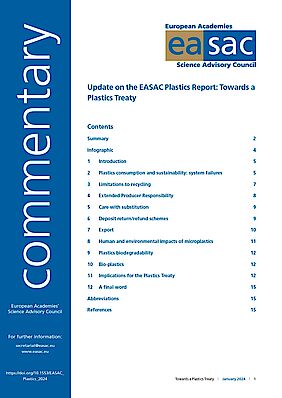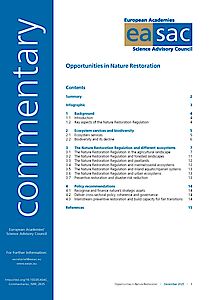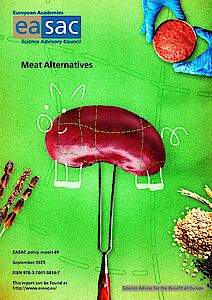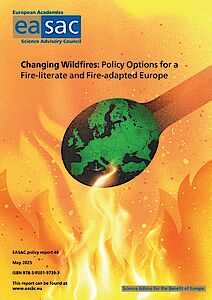Publications
Update on the EASAC Plastics Report: Towards a Plastics Treaty
Systemic failures are driving rapid growth in production, consumption and leakage of plastics in the marine, terrestrial and freshwater environments, shows a new EASAC Commentary. The summary of the latest scientific evidence aims to inform negotiations of a much-needed International Plastics Treaty. With current policies, global plastic waste is expected to nearly triple by 2060.
"Negotiators must tackle the conflicts in the whole system," says EASAC's Prof. Michael Norton. "It will hurt commercial interests and thus not be a piece of cake. But to slow and reverse damage to the environment, biodiversity, and ultimately risks to human health, the Treaty must put an end to the continued growth in the production of plastics."
The 21st century is likely to be remembered as the "plastic age". Plastics began their triumphant march in the 1960's; today the planet is literally drowning in plastics. More than 353 million tons of plastic waste have been produced in 2019, and according to OECD figures, it will increase to as much as 1014 million tons annually by 2060[1] unless drastic measures are taken.
Reducing plastics pollution by 80% by 2040 demands a circular economy
To set up an International Plastics Treaty for success, EASAC advocates a system approach to reduce the volume of plastics production and consumption, ensure all plastics are reusable, recyclable or compostable, and keep plastics in circulation for as long as possible. Models suggest that by reducing demand by 30% and increasing the recycling rate to 20%, plastic pollution could be reduced by 80% by 2040.
The Commentary argues that it is time to make the polluters pay. Voluntary mechanisms and market mechanisms are insufficient to address the problem. They make clear that banking on growth is not an option, not least because switching to many so-called "bio"-materials cannot be justified on resource or environmental grounds either.
Environment Co-chair Professor Andràs Bàldi explains: "Plastics do not rot; they only break down in smaller pieces and do not decompose. Meanwhile, the resulting micro- and nanoplastics have spread everywhere on the planet and are also found in our bodies. While the fatal effects on marine life are very obvious, we still do not have the evidence to allow us to assess our own risk from plastic contamination."
[1] OECD, 2022
back to overview
































